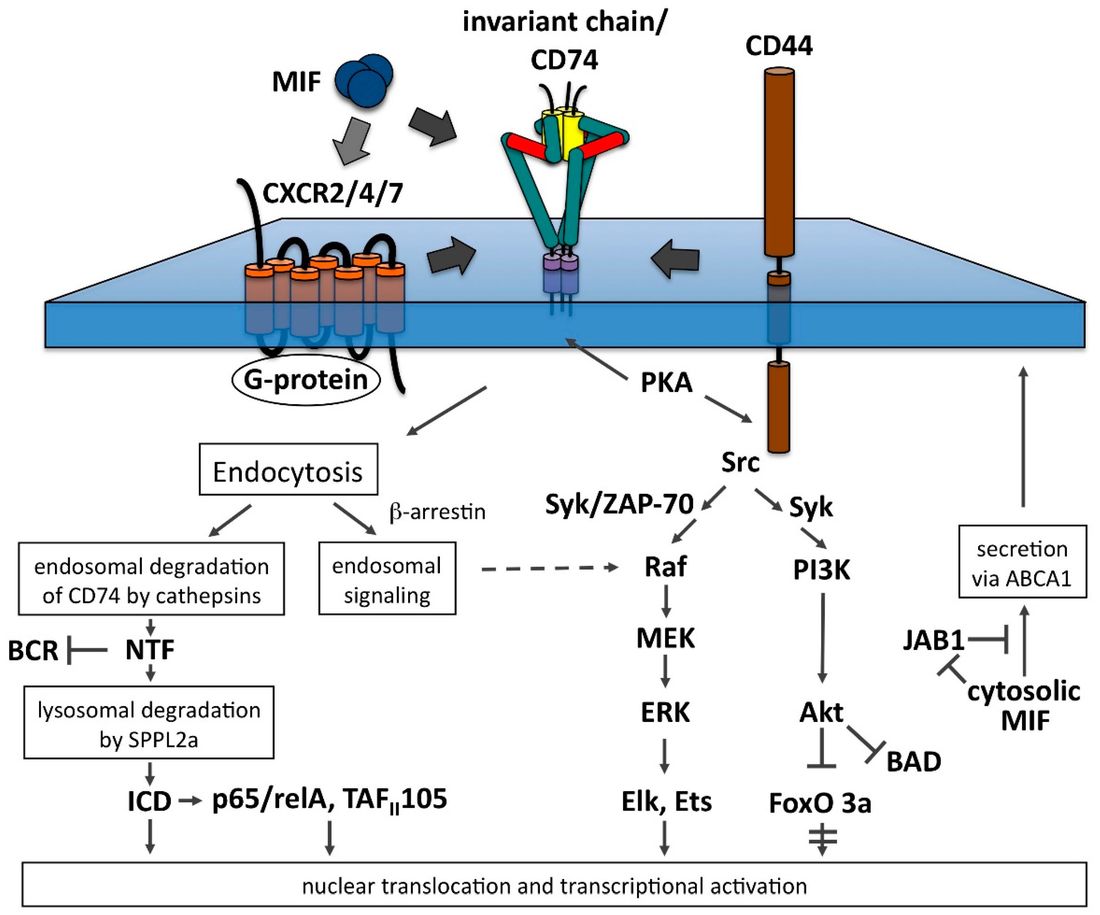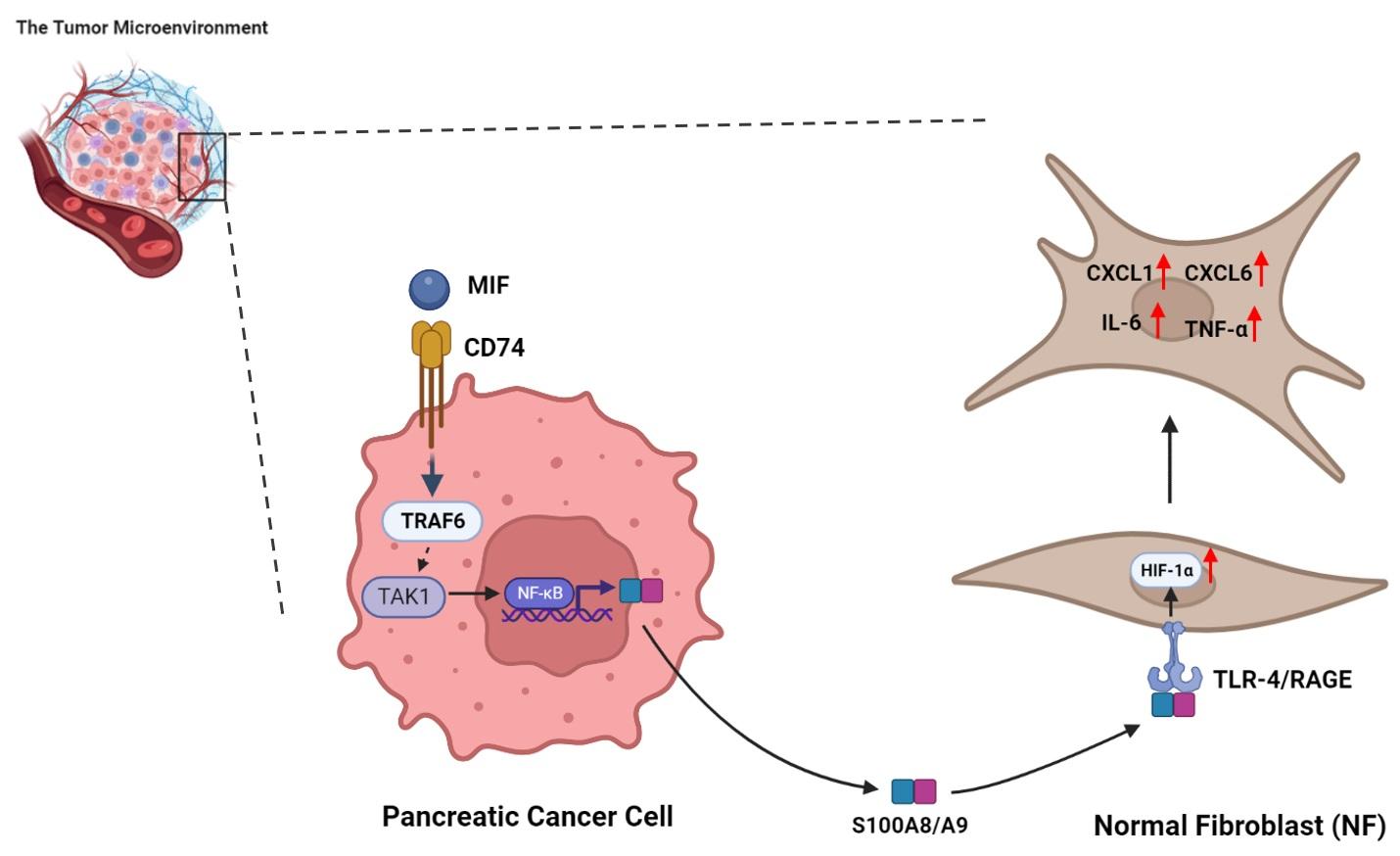CD74 Assay Portfolio Service
Background What We Can Offer Publication Why Choose Us FAQs Customer Review Related Services Contact Us
CD74: A Multifunctional Receptor in Immunity and Cancer
CD74, also known as the invariant chain, is a transmembrane glycoprotein that serves as a high-affinity receptor for macrophage migration inhibitory factor (MIF) and D-dopachrome tautomerase (D-DT/MIF-2). Structurally, it consists of an N-terminal cytoplasmic domain, a transmembrane region, and an extracellular domain with glycosylation sites. While its primary role is in antigen presentation—guiding MHC class II molecules and preventing premature peptide binding—CD74 also functions as a cell surface receptor. However, MIF-induced signaling requires coreceptors like CD44 or CXCR4, which activate pathways such as ERK1/2 MAPK, PI3K/AKT, and NF-κB, promoting cell survival, proliferation, and inflammation.
CD74 is overexpressed in various cancers, including hematological malignancies and solid tumors. Its interaction with MIF drives tumor progression by enhancing pro-inflammatory cytokines (e.g., IL-8) and angiogenesis. Given its roles in immunity and oncogenesis, CD74 is a promising therapeutic target and potential biomarker for cancer treatment.
 Fig.1 Signal transduction pathways emanating from MIF-bound CD74-CD44 complexes.1, 3
Fig.1 Signal transduction pathways emanating from MIF-bound CD74-CD44 complexes.1, 3
What We Can Offer?
Responding to customer needs, Creative Biolabs has expanded its tumor marker assay services. Our portfolio of systems and assay can help support the essential role of your research. Our CD74 assay portfolio services for research include but are not limited to:
-
Luciferase assay for monitoring NF-κB activation
-
In vitro stimulation assay
-
Cell proliferation assay
-
Transwell migration assay and wound healing assay
-
Transfection
-
ELISA for cytokine detection
-
Immunoblot
-
Dot-blot binding assay
-
Immunohistochemistry (IHC) and immunofluorescence (IF)
Our goal is as much as possible by always being responsive to customer feedback and requests that really help to achieve research goals as quickly and as easily as possible. Please feel free to contact us.
Publication
Pancreatic ductal adenocarcinoma (PDAC) remains one of the most lethal malignancies, with a 5-year survival rate below 10%. The tumor microenvironment (TME) plays a crucial role in PDAC progression, yet the molecular drivers of its immunosuppressive nature are poorly understood. This study investigates CD74, a receptor for macrophage migration inhibitory factor (MIF), as a key regulator of PDAC aggressiveness. We demonstrate that CD74 knockdown suppresses tumor growth, invasion, and metastasis while promoting apoptosis. Mechanistically, CD74 regulates the secretion of pro-inflammatory proteins S100A8/A9, which activate cancer-associated fibroblasts to create an immunosuppressive TME via the TRAF6-NF-κB pathway. Our findings reveal CD74 as both a prognostic biomarker and therapeutic target, offering new strategies to disrupt the inflammatory cascade in PDAC. These insights bridge tumor cell intrinsic pathways with stromal remodeling, addressing a critical gap in PDAC biology.
 Fig.2 CD74 drives oncogenic signaling in pancreatic cancer via S100A8/A9 and tumor microenvironment crosstalk.2, 3
Fig.2 CD74 drives oncogenic signaling in pancreatic cancer via S100A8/A9 and tumor microenvironment crosstalk.2, 3
Why Choose Us?
At Creative Biolabs, we combine deep immuno-oncology expertise with a complete suite of CD74-focused assays to accelerate your cancer research. Our integrated approach delivers reliable, actionable data through every stage - from initial binding studies to comprehensive mechanism-of-action analyses. We understand CD74's critical role in immune evasion and tumor progression, allowing us to design targeted solutions that generate clear, quantifiable results. By serving as your single partner, we eliminate workflow fragmentation while maintaining the highest scientific standards. Whether you need basic characterization or advanced functional studies, our end-to-end services provide the consistent quality and scientific rigor needed to advance your therapeutic candidates efficiently.
FAQs
Q1: What is the scope of your CD74 assay services?
A1: Our service offers a comprehensive suite of assays, from basic binding and expression analysis to detailed functional studies like cell proliferation and signaling pathway analysis. We provide a complete characterization of your compound's interaction with CD74.
Q2: Can you customize assays for my specific compound or cell line?
A2: Yes. Our service is highly flexible and tailored to your needs. We work closely with you to design and customize the assays to perfectly match the unique characteristics of your compound and the specific research questions you need to answer. Our goal is to provide a truly bespoke solution for your project.
Q3: Are your services suitable for early-stage discovery?
A3: Our portfolio is ideal for all stages of drug discovery, from high-throughput screening to in-depth characterization of a lead compound. Our services can be tailored to meet your specific needs at any stage of your research journey.
Customer Review
-
Clear Pathway Validation
Using Creative Biolabs' CD74 assay portfolio significantly improved our research by providing clear, quantitative evidence of pathway modulation. Their expertise in experimental design was invaluable for our project's success. - Dr. Rya*** S
-
Accelerated Screening
Creative Biolabs' high-throughput CD74 binding assays facilitate rapid initial screening of compound libraries, allowing you to quickly identify and prioritize lead candidates. This is a major time-saver compared to traditional, slower methods. - Dr. Ste*** J
Related Services
Creative Biolabs offers several complementary services that can help you achieve your research goals. In addition to our CD74 assay portfolio service, you may also be interested in our:
Tumor Profiling for Biomarker Discovery
By identifying new biomarkers through comprehensive tumor profiling, personalized medicine can be advanced. Creative Biolabs offers various technologies, including NGS, ISH, PCR, IHC, and microarrays, to identify tumor-specific mutations and their functions.
Learn More →
Inflammatory Reaction Detection Service
Creative Biolabs assists in anti-cancer drug development by providing cardiotoxicity and inflammation reaction testing services. This helps identify potential adverse effects early, allowing teams to predict cardiac impact and ultimately reduce costs.
Learn More →
Contact Us
Our CD74 assay portfolio service provides the comprehensive and reliable data you need to confidently advance your projects. By partnering with us, you gain access to a full suite of cutting-edge assays and a team of experts dedicated to your success. We are ready to assist you in unlocking the full therapeutic potential of your drug candidates.
References
-
Lindner, Robert. "Invariant chain complexes and clusters as platforms for MIF signaling." Cells 6.1 (2017): 6. DOI: https://doi.org/10.3390/cells6010006
-
Hong, Woosol Chris, et al. "CD74 promotes a pro-inflammatory tumor microenvironment by inducing S100A8 and S100A9 secretion in pancreatic cancer." International Journal of Molecular Sciences 24.16 (2023): 12993. DOI: https://doi.org/10.3390/ijms241612993
-
Distributed under Open Access license CC BY 4.0, without modification.


 Fig.1 Signal transduction pathways emanating from MIF-bound CD74-CD44 complexes.1, 3
Fig.1 Signal transduction pathways emanating from MIF-bound CD74-CD44 complexes.1, 3
 Fig.2 CD74 drives oncogenic signaling in pancreatic cancer via S100A8/A9 and tumor microenvironment crosstalk.2, 3
Fig.2 CD74 drives oncogenic signaling in pancreatic cancer via S100A8/A9 and tumor microenvironment crosstalk.2, 3
